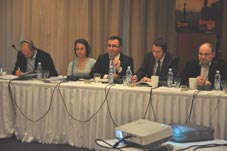
CARE International in the Caucasus evaluates SIIMS final findings
By Keti Arjevanidze
Friday, November 30
“A relatively small amount of start-up cash combined with appropriate training can enable an entrepreneur with a good idea to substantially raise household income on a sustainable basis,” was one of the findings that CARE, an international development NGO, shared with various stakeholders after summing up a four-year IDP (Internally Displaced Persons)-focused project last week.
In 2008 women in IDP communities in Georgia were granted $1000 each. This enabled 84 entrepreneurs to earn an average of $90 per month. By June 2012 almost half of the businesses (48%) had earned more money than the grant cost. But the benefits of the scheme go beyond the monetary value, CARE representatives noted. The women entrepreneurs became models in their community, giving other women the idea that they too could run a successful business.
Grants for female entrepreneurship are just one component of a multi-faceted project which was launched in the aftermath of the 2008 August war to bring remedies to the economic woes and social concerns of 10,000 displaced people. The project called Stabilization and Integration of IDPs into Mainstream Georgia Society (SIIMS) was implemented by CARE Norway and CARE International with the financial support of the Norwegian Ministry of Foreign Affairs.
The project aimed to create socio-economic ties between IDPs and local communities through a series of activities grouped in five thematic areas of intervention: income generation and economic development, community development, civil society strengthening, capacity building of children and adolescents, and information sharing and cooperation with the local government. CARE invited development practitioners, representatives of international and local NGOs, government officials and media to share which recovery schemes worked better than others and which could be used as models for further replication.
Mission Director of CARE International in the Caucasus Thomas Reynolds said CARE's approach was to give local communities a voice in identifying their needs. "The local people had ideas how to make society fair...they have powerful ideas and we have the technical and financial resources,” Reynolds stated.
SIIMS project director Vakhtang Piranishvili thinks the project was successful and listed the main factors of success. “A pure approach, the program's clear introduction to the IDPs, active monitoring– these were all very important, at that time the level of distrust towards international organizations was very high,” Piranishvili explained.
While CARE representatives shared some of the successful models for economic recovery, integration of displaced people with local communities, women and youth empowerment, etc. in an extensive report, they also stressed the need for further work.
“IDPs should remain the priority, they still face challenges, IDPs should stay on target and they should be seen as partners and as leaders with good ideas," Thomas Reynolds suggested.
Vakhtang Piranishvili discussed durable solutions for IDPs. “Unemployment is still high in these areas. There is still a vital need for the international community's engagement in finding durable solutions for the IDPs... This is a message for donors,” the SIIMS Project director said.
Representative of the Ministry of Internally Displaced People from the Occupied Territories Valeri Kopaleishvili, emphasized the importance of the creation of new communities in Georgia in helping IDP's. Kopaleishvili also stressed the importance of the government's involvement, especially the involvement of local authorities before revealing the Ministry's plans for next year. "Now there are changes in the action plan, new buildings are planned in Poti and Zugdidi.”

